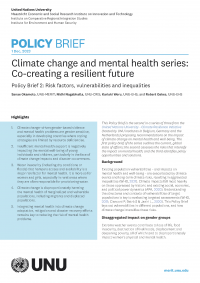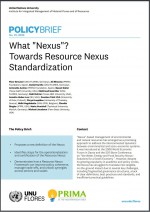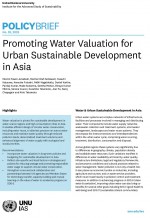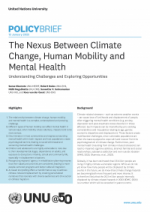Co-Creating a Resilient Future: Risk Factors, Vulnerabilities and Inequalities - Climate Change and Mental Health Series

Publication Date:
2023
Volume:
2
Series Title:
UNU Climate Change and Mental Health Policy Brief Series
Publication Language:
EN
Copyright Year:
2023
Abstract:
Highlights
- Climate change–driven gender-based violence and mental health problems are gender sensitive, especially in developing countries where coping strategies are limited by resource deficiencies.
- Insufficient mental health support is negatively impacting the mental well-being of young individuals and children, particularly in the face of climate change impacts and disaster occurrences.
- Water insecurity (including dry conditions or floods) that hampers access and availability is a major risk factor for mental health. It is more so for women and girls, especially in rural areas where they are often responsible for provisioning water.
- Climate change is disproportionately harming the mental health of marginalized and vulnerable populations, including migrants and displaced populations.
- Integrating mental health into climate change adaptation, mitigation and disaster recovery efforts remains key to reducing the risk of mental health problems.
This Policy Brief is the second in a series of three from the United Nations University - Climate Resilience Initiative (hosted by UNU institutes in Belgium, Germany and the Netherlands) proposing recommendations on the impact of climate change on mental health and well-being. The first policy brief of the series outlines the current, global state of affairs; the second assesses the risks that intensify the impact on mental health; and the third identifies policy opportunities and solutions.





